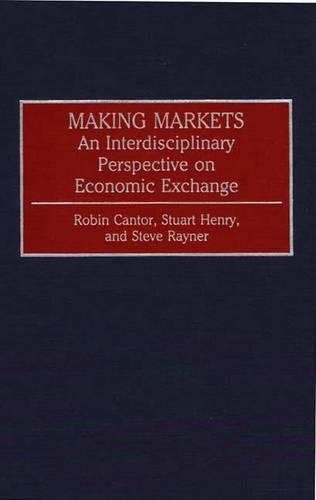
Making Markets: An Interdisciplinary Perspective on Economic Exchange
(Hardback)
Publishing Details
Making Markets: An Interdisciplinary Perspective on Economic Exchange
By (Author) Robin Cantor
By (author) Stuart Henry
By (author) Steve Rayner
Bloomsbury Publishing PLC
Praeger Publishers Inc
22nd July 1992
United States
Classifications
Tertiary Education
Non Fiction
Anthropology
330.1
Physical Properties
Hardback
208
Description
This book considers the social and economic arrangements that would be necessary for rational mechanisms of exchange and distribution to emerge, function, and remain viable if extreme conditions produced an absence or the severe destruction of an institutional infrastructure and of resource endowments. Written by an economist, a sociologist, and an anthropologist, the study confronts such radical circumstances from an interdisciplinary perspective, thereby rethinking and revising some cherished conventional economic and social assumptions. At one level, the book discusses the kinds of market structures that would be viable under different socioeconomic conditions. At another level, the analysis questions monolithic approaches to applied economic analysis and policy based on what works under existing conditions. To illustrate the applicability of theoretical modeling, the authors consider two policy areas: economic recovery from a major societal disaster and economic development. The book will be of particular interest to students of applied economics, but it will also be of interest to those concerned with social ecology, economy and society, economic history, economic anthropology, applied sociology, and developmental studies. It will be especially valuable to scholars in Eastern European and socialist economic systems that are currently seeking to establish market economies.
Reviews
Making Markets is an interdisciplinary attempt by an economist, anthropologist, and sociologist to provide models of economic exchange under different market and premarket forms. Unfortunately the ambition of the enterprise exceeds the results. Every economist knows that the perfect competitive market is a purely theoretical concept that demonstrates how under ideal conditions the marginal cost and marginal utility of every product will be equal and the economy will produce the optimum mix of goods using an optimum mix of productive factors. It is recognized that in actuality, the ideal market is unlikely. Moreover, even in advanced societies, more primitive market types and custom-directed forms of exchange coexist along with the developed markets. And it is clear that the sophisticated market form could not exist without a nexus of legislative, custom, and ethical rules. (The authors somehow give short shrift to the latter factor.) The authors point out that when authority and custom break down and markets are destroyed, exchange (such as it is) is dominated by banditry, thuggery, and dacoits. The example of Somalia is a case in point. Most of the text is taxonomic. It seems to lack a centralizing theme except to make the obvious point that where the basic legal and social conditions are lacking, it is difficult to institute operational market forms. The bibliography is very complete and useful. For advanced undergraduate to faculty collections.-Choice
"Making Markets is an interdisciplinary attempt by an economist, anthropologist, and sociologist to provide models of economic exchange under different market and premarket forms. Unfortunately the ambition of the enterprise exceeds the results. Every economist knows that the perfect competitive market is a purely theoretical concept that demonstrates how under ideal conditions the marginal cost and marginal utility of every product will be equal and the economy will produce the optimum mix of goods using an optimum mix of productive factors. It is recognized that in actuality, the ideal market is unlikely. Moreover, even in advanced societies, more primitive market types and custom-directed forms of exchange coexist along with the developed markets. And it is clear that the sophisticated market form could not exist without a nexus of legislative, custom, and ethical rules. (The authors somehow give short shrift to the latter factor.) The authors point out that when authority and custom break down and markets are destroyed, exchange (such as it is) is dominated by banditry, thuggery, and dacoits. The example of Somalia is a case in point. Most of the text is taxonomic. It seems to lack a centralizing theme except to make the obvious point that where the basic legal and social conditions are lacking, it is difficult to institute operational market forms. The bibliography is very complete and useful. For advanced undergraduate to faculty collections."-Choice
Author Bio
ROBIN CANTOR an economist, is program director of Decision, Risk, and Management Science at the National Science Foundation. STUART HENRY is Associate Professor of Sociology at Eastern Michigan University. He is the author of several books, including Informal Institutions: Alternative Networks in the Corporate State (1981), Private Justice: Toward Integrated Theorizing in the Sociology of Law (1983), and The Informal Economy (1987). STEVE RAYNER is a Professor of the Science in Society Programme at The Said Business School, University of Oxford. He is the author of several books, including Rules, Decisions, and Inequality in Egalitarian Societies (1988) and Energy Policies and the Greenhouse Effect (1991).
